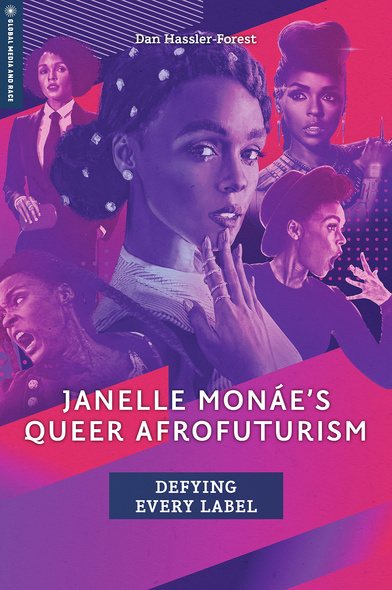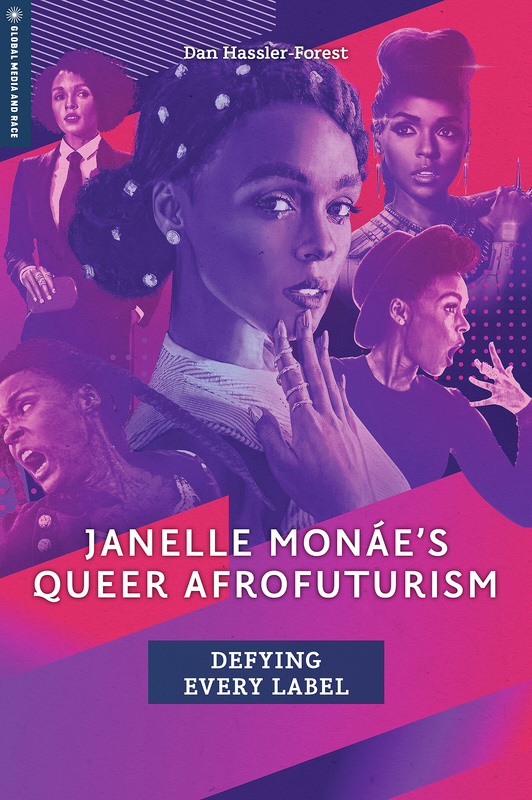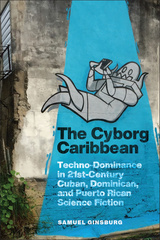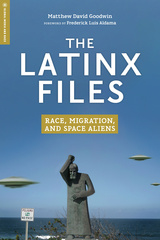Janelle Monáe's Queer Afrofuturism
Defying Every Label
SERIES:
Global Media and Race
Rutgers University Press
Singer. Dancer. Movie star. Activist. Queer icon. Afrofuturist. Working class heroine. Time traveler. Prophet. Feminist. Android. Dirty Computer.
Janelle Monáe is all these things and more, making her one of the most fascinating artists to emerge in the twenty-first century. This provocative new study explores how Monáe’s work has connected different media platforms to strengthen and enhance new movements in art, theory, and politics. It considers not only Monáe’s groundbreaking albums The ArchAndroid, The Electric Lady, and Dirty Computer, but also Monáe’s work as an actress in such films as Hidden Figures and Antebellum, as well as her soundtrack appearances in socially-engaged projects ranging from I May Destroy You to Us. Examining Monáe as a cultural icon whose work is profoundly intersectional, this book maps how she is actively reshaping discourses around race, gender, sexuality, and capitalism. Tracing Monáe’s performances of joy, desire, pain, and hope across a wide range of media forms, it shows how she imagines Afrofuturist, posthumanist, and postcapitalist utopias, while remaining grounded in the realities of being a Black woman in a white-dominated industry. This is an exciting introduction to an audacious innovator whose work offers us fresh ways to talk about identity, desire, and power.
Janelle Monáe is all these things and more, making her one of the most fascinating artists to emerge in the twenty-first century. This provocative new study explores how Monáe’s work has connected different media platforms to strengthen and enhance new movements in art, theory, and politics. It considers not only Monáe’s groundbreaking albums The ArchAndroid, The Electric Lady, and Dirty Computer, but also Monáe’s work as an actress in such films as Hidden Figures and Antebellum, as well as her soundtrack appearances in socially-engaged projects ranging from I May Destroy You to Us. Examining Monáe as a cultural icon whose work is profoundly intersectional, this book maps how she is actively reshaping discourses around race, gender, sexuality, and capitalism. Tracing Monáe’s performances of joy, desire, pain, and hope across a wide range of media forms, it shows how she imagines Afrofuturist, posthumanist, and postcapitalist utopias, while remaining grounded in the realities of being a Black woman in a white-dominated industry. This is an exciting introduction to an audacious innovator whose work offers us fresh ways to talk about identity, desire, and power.
An expert critic of the ideological construction of transmedia worlds, Dan Hassler-Forest offers a tour de force analysis of virtuoso music and media artist Janelle Monae as a vernacular theorist and intersectional figure. The resulting book makes a compelling case that her interventions into popular culture may help to shape how we collectively imagine our futures and the world according to Janelle Monae is a better one by far.
Building on a close reading of the transformative potential central to Afrofuturism, Janelle Monáe's Queer Afrofuturism highlights how Monáe's mix of speculation and liberation shines a light on acceptance, care, and community central to Afrofuturism's appeal. Carefully framing intersectional concerns around bodies and power expressed in Monáe's artistic work allows Hassler-Forest to provide an intriguing examination of an artist who has quickly come to embody the transformative potential of black speculative practice.
Hassler-Forest clarifies why artist-activists like Monae are so central not only to how we can imagine a future that is free from the strictures of white supremacy but also to how we can harness the power of utopian thinking in the here and the now.
Pg. 99: Dan Hassler-Forest's 'Janelle Monáe’s Queer Afrofuturism'
DAN HASSLER-FOREST is an assistant professor of media studies at Utrecht University in the Netherlands. He is the author of Capitalist Superheroes and Science Fiction, Fantasy, and Politics: Transmedia Storytelling Beyond Capitalism.
Introduction
Vector 1: AFROFUTURISM
Vector 2: BLACK FEMINISM
Vector 3: : INTERSECTIONALITY
Vector 4: : POSTHUMANISM
Vector 5: POSTCAPITALISM
Acknowledgments
Notes
Bibliography
Index
Vector 1: AFROFUTURISM
Vector 2: BLACK FEMINISM
Vector 3: : INTERSECTIONALITY
Vector 4: : POSTHUMANISM
Vector 5: POSTCAPITALISM
Acknowledgments
Notes
Bibliography
Index










